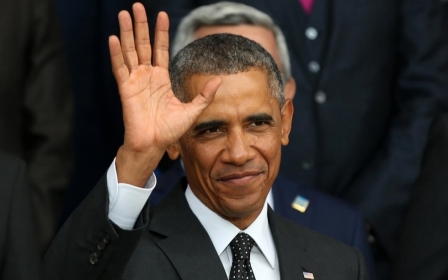IS militants kill 40 Iraqi soldiers, capture 70

Militants attacked an Iraqi army base west of Baghdad with six suicide bombers, killing 40 soldiers and capturing at least 70 others who fled, a senior army officer said Monday.
Four suicide bombers detonated explosives-rigged armoured personnel carriers at the base in Saqlawiyah on Sunday, while two others attacked with explosive belts, General Rashid Fleih told AFP.
"Forty soldiers and officers were killed and contact was lost with between 70 and 80" who fled the base and were subsequently captured by the Islamic State (IS) group, Fleih said.
IS militants, who led an offensive that overran swathes of the country in June, detonated a bridge five days ago in Al-Sijr, near the base, isolating it, he said.
They also planted bombs on roads leading to the area, making it even more difficult to send reinforcements and leaving the soldiers to fight the militants from inside the base.
Then the suicide bombers struck on Sunday in one of the deadliest single attacks on Iraqi soldiers in years.
Prime Minister Haidar al-Abadi has ordered that "the negligent brigade commanders" involved in the events in Saqlawiyah and Al-Sijr be detained and investigated, his office said.
The United States launched a campaign of air strikes against IS in Iraq last month and France has also bombed the group, which holds significant territory in neighbouring Syria.
Meanwhile, Australian warplanes are being deployed to the Middle East to join the US-led campaign of air strikes on IS targets in northern Iraq, Australian Defence Minister David Johnston said on Monday.
"We will provide a number of military platforms, up to eight Super Hornet aircraft to participate in a US-led coalition in delivering air strikes," he told reporters in Baghdad after meeting Abadi.
Australian Prime Minister Tony Abbott announced on September 14 that Australia would send fighter jets and forces to the United Arab Emirates as its contribution to the US-led military effort against IS.
"We are in the process of deploying them to the Middle East," Johnston said Tuesday, adding however that more preparation work was needed before the Australian jets were brought into action.
"We are some distance from the start of that now, we need to deal with a few technical matters with respect to operations," said Johnston.
The deployment also includes an E-7 Wedgetail early warning and control aircraft and an aerial refuelling tanker aircraft, as well as special forces who will act as military advisers.
According to the Pentagon, US aircraft have carried out 178 air strikes against IS targets in Iraq since August 8. France has since joined the campaign and launched its own strikes.
During his meeting with Johnston, Abadi reaffirmed his "rejection of any ground intervention in Iraq," his office said.
Washington has repeatedly asserted that it would not deploy ground troops to the country in which its forces fought a bloody and costly war before withdrawing at the end of 2011.
Australia was one of the four countries -- together with the United States, the Britain and Poland -- that invaded Iraq in 2003 to topple Saddam Hussein.
Stay informed with MEE's newsletters
Sign up to get the latest alerts, insights and analysis, starting with Turkey Unpacked
Middle East Eye delivers independent and unrivalled coverage and analysis of the Middle East, North Africa and beyond. To learn more about republishing this content and the associated fees, please fill out this form. More about MEE can be found here.




